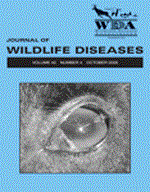The purpose of this study was to investigate the role of ectoparasites in transmitting Bartonella infections in wild Richardson's ground squirrels (Spermophilus richardsonii). Richardson's ground squirrels were trapped, examined for fleas, and tested for Bartonella bacteremia once monthly, at six sites, from April to September 2004. After the initial trapping session in April, burrows at three sites were treated with deltamethrin insecticide. Richardson's ground squirrels trapped on treated sites were less likely to have fleas and had fewer fleas than squirrels on control sites in all months following treatment. We found no difference in the prevalence of Bartonella infections on control and treated sites in May, immediately following treatment; however, significantly fewer squirrels were infected with Bartonella on treated sites in June and July. We conclude that ectoparasites are a main route of transmission for Bartonella infections in Richardson's ground squirrels.
How to translate text using browser tools
1 October 2006
EFFECT OF EXPERIMENTAL ECTOPARASITE CONTROL ON BARTONELLA INFECTIONS IN WILD RICHARDSON'S GROUND SQUIRRELS
C. Jardine,
C. Waldner,
G. Wobeser,
F. A. Leighton

Journal of Wildlife Diseases
Vol. 42 • No. 4
October 2006
Vol. 42 • No. 4
October 2006
Bartonella
deltamethrin
ectoparasite
flea
insecticide
Richardson's ground squirrel
Spermophilus richardsonii




